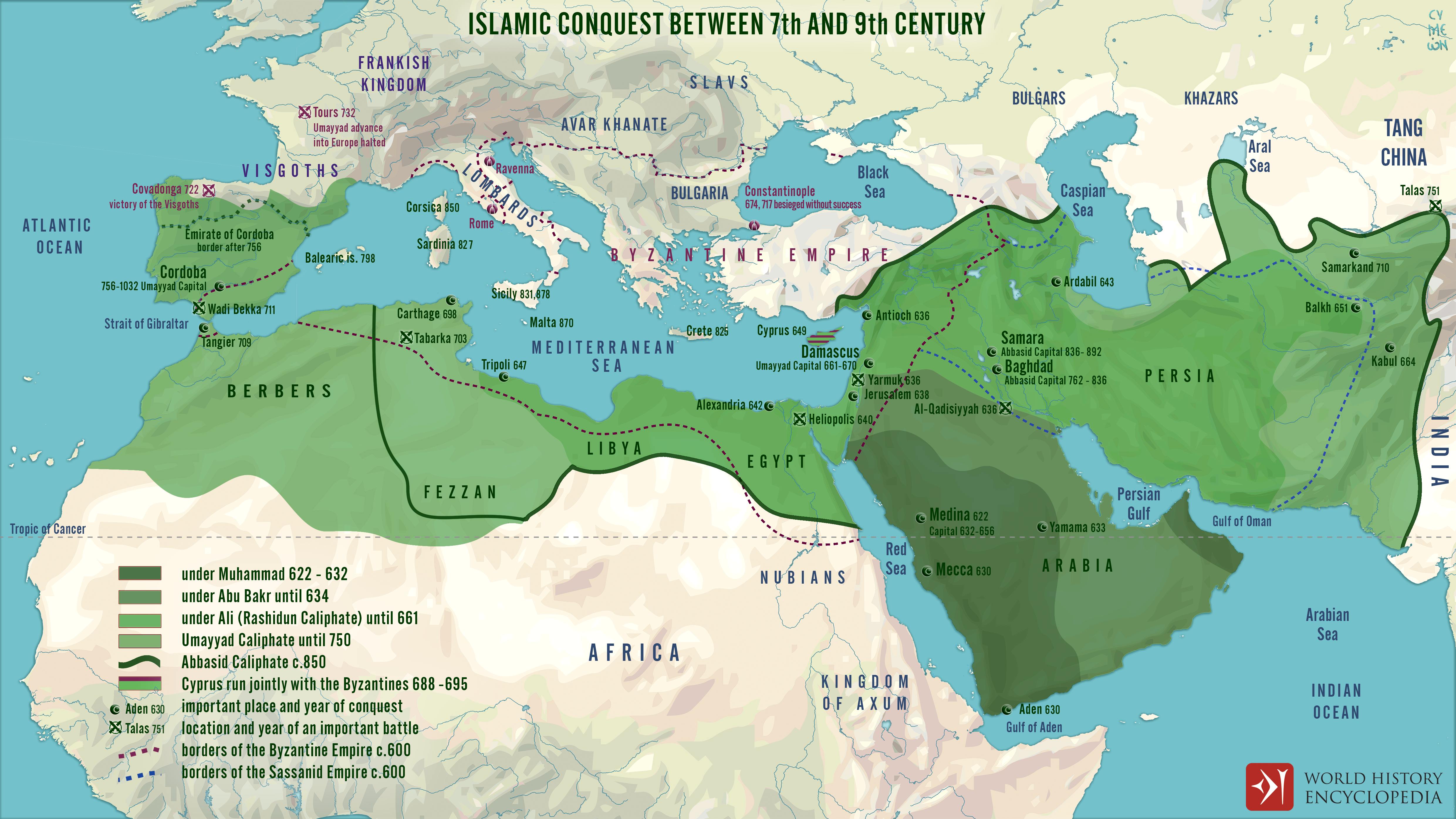


The Islamic Realm continued to expand under the leadership of Uthman, the third caliph after Prophet Muhammad ﷺ Uthman was a close and beloved friend of the Prophet and had been given the title of Dhun-nurayn, 'Possessor of Two Lights', as the Prophet had married him to his daughter, Ruqayya, and, after her death, to his other daughter, Umm Kulthum.
He was known for his striking good looks, modesty, and acts of charity. During his reign, he laid important infrastructural and administrative foundations for the new caliphate. However, Uthman's reliance on family members for help with government would later lead to accusations against him, ultimately leading to his assassination.
Uthman's twelve-year reign was a time of unity, peace, and prosperity for the young Islamic caliphate. He was a wealthy trader himself and set about consolidating the empire and taking measures to encourage trade and commerce. Infrastructure and transport, which are essential for trade and business, were significantly developed. For example, Uthman opened up a new port in Jeddah for sea trade, and substantially expanded the masjid of the Prophet in Medina. In those days the central masjid of a city was not only a place of worship, but also the political and educational hub of the community.
Interest-free loans were made available from the Public Treasury for small businesses, to encourage start-ups. Uthman also continued most of his predecessor's policies, such as allowing the peasants in conquered territories to retain their freedoms and possessions.
Uthman's expansion of the Islamic lands continued during his reign, and he ordered the construction of the first Muslim navy under his clansman, Muawiya, to take on the Romans in the Mediterranean. The Caliphate now covered a territory much larger than either the Romans or Persians had ever ruled, and immense amounts of wealth were flowing into Medina. Uthman continued the practice of distributing public funds among the Muslim community, and often the distribution of wealth would be informal, with the caliph simply calling out in public for anyone in need to come and collect food and provisions.

Six years into his period in office, Uthman lost the Prophet's ring, which carried the official seal and had been handed down from one caliph to the next. To many scholars, looking back, this event marked the beginning of the internal fracturing of the Muslim community and the coming of 'the Tribulations' (al-fitan).
Malicious rumours had begun to spread about Uthman in the provinces. He was accused of favouring his relatives and giving them huge handouts from the public treasury. Uthman was quick to defend himself and sought repeatedly to maintain the peace, replacing unpopular governors and acceding to demands. But the rumours persisted and dissension grew...until rebellion reared its ugly head.
A group of unhappy Muslims led by Muhammad son of Abu Bakr came from Egypt to demand the removal of their governor. Uthman complied with the request and appointed Muhammad as the new governor. On the way back to Egypt, Muhammad's party intercepted a slave making haste in the same direction and found a letter in his possession addressed from the caliph to his old governor in Egypt, ordering him to execute Muhammad and his party on their arrival. This apparent act of treachery inflamed passions, and the group headed straight back to Medina.
A council of the leading Companions was summoned, and the letter was revealed to them. Uthman denied any knowledge of the letter, and suspicions turned to his nephew, Marwan, who held the caliph's seal. The rebels surrounded Uthman's residence and demanded that he turn over Marwan to face trial. Members of Uthman's powerful clan urged him to fight against the rebel group, but Uthman refused to raise the sword against fellow believers. He said, "I will not be the first caliph of the Messenger of God in his ummah to shed their blood".
Despite Uthman's efforts to maintain peace among the Muslims, three of the rebels, led by Muhammad, broke into his house with the intention of murder. They found the Caliph reading the Quran, with only his wife present in the room. Muhammad grabbed Uthman by his beard. The Caliph looked at him and said sadly, "By Allah, if your father could see you now, your behaviour towards me would cause him great distress".
The words struck Muhammad's heart and he stepped back, uncertain, but his accomplices lunged forward and struck the Righteous Caliph with their swords. His wife tried in vain to protect him, and some of her fingers were cut off in the process. She cried out for help, but it was too late. Thus, tragically, ended the life of the son-in-law and beloved friend of the Prophet.
After Uthman's assassination, Marwan fled to Syria, carrying with him the bloodied shirt of Uthman and the severed fingers of his wife. These were displayed publicly to rouse the Muslims to seek justice for Uthman's murder.
Later on, one of Marwan's sons, Abdul-Malik, would become one of the most famous of the Umayyad caliphs, and would build, among other things, the Dome of the Rock Masjid that dominates the Jerusalem skyline until today.
Did you know that Uthman was a very modest person, to the extent that the Prophet ﷺ once said,
"The Angels feel shy in front of Uthman!" (Muslim)
BTW...it is very good to be modest, as the Prophet ﷺ said, "Modesty is from Faith". (Bukhari & Muslim)